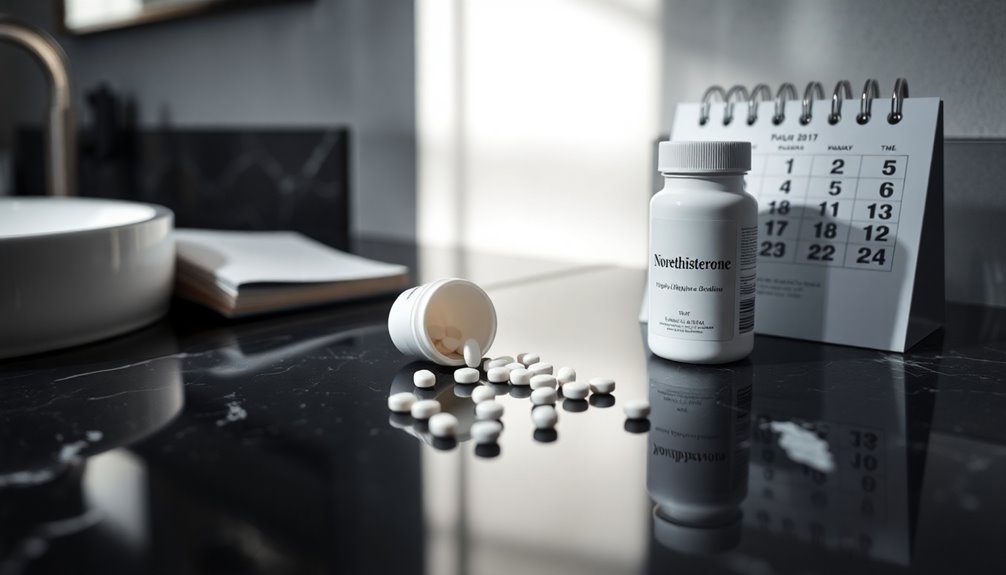Period-delaying medications, like norethisterone, let you postpone your menstrual cycle when necessary, giving you control over your reproductive health. This synthetic hormone mimics progesterone and can delay your period for up to 17 days. You take it starting three days before your expected period. While it's effective, it's essential to consult a healthcare provider beforehand to assess suitability and risks. Want to learn more about its usage and alternatives? There's plenty more to explore!
Key Takeaways
- Period-delaying medications, like norethisterone, are used to postpone menstrual cycles for up to 17 days.
- Norethisterone mimics natural progesterone and requires a specific dosage of 5 mg taken three times daily.
- It is essential to consult a healthcare provider before using period-delaying medications due to potential risks and contraindications.
- Common side effects include acne, nausea, and breast pain, while serious risks involve increased blood clotting.
- Alternative methods for skipping periods include hormonal birth control options like combined oral contraceptives and hormonal IUDs.
What Are Period-Delaying Medications?

Period-delaying medications are designed to help you postpone your menstrual cycle when necessary. One common medication is norethisterone, a synthetic hormone that allows you to delay your period for up to 17 days.
To use it effectively, you'll typically start taking one 5 mg tablet three times daily, beginning three days before your expected period. Norethisterone works by maintaining the uterine lining, preventing the hormonal drop that triggers menstruation.
However, be aware that these medications aren't contraceptives, so it's essential to use other methods for pregnancy prevention.
While period delay medications can be helpful, they may come with side effects like acne, menstrual spotting, low mood, and breast pain, which you should consider before deciding to use them. Additionally, understanding narcissistic behaviors can help in recognizing emotional challenges that may arise during significant life changes.
How Do Period-Delay Tablets Work?

When you take period-delay tablets like norethisterone, they work by mimicking the hormone progesterone in your body. This artificial hormone helps you postpone your menstrual period by preventing the usual signals that trigger menstruation.
To effectively delay your period, you should start taking the tablets three days before your expected period, with a dosage of one tablet taken three times a day. You can achieve a maximum delay of about 17 days, after which your period typically starts within 2-3 days of stopping the medication. Additionally, some individuals may experience emotional dysregulation as a side effect while using these tablets, which can affect their overall mood during the delay.
Norethisterone: The Key Ingredient

Norethisterone is the key ingredient in period-delaying medication, working by mimicking the natural hormone progesterone to postpone your menstrual cycle.
While it can effectively delay your period for up to 17 days, you should be aware of potential side effects like acne and nausea. Additionally, maintaining a balanced diet that includes fiber-rich foods like chia seeds can support overall health during this time.
It's important to understand how this medication works and what to expect while taking it.
Mechanism of Action
To effectively delay your period, the key ingredient—norethisterone—works by mimicking natural progesterone in your body.
This synthetic progestogen helps maintain the uterine lining, preventing the hormonal drop that triggers menstruation. By sustaining elevated progesterone levels, norethisterone effectively delays menstruation when taken in a dosage of 5 mg three times a day, starting three days before your expected period.
With this approach, you can postpone your menstrual period by up to 17 days. Once you stop taking norethisterone, your hormone levels will decrease, and you can expect your period to begin within 2 to 3 days. Additionally, understanding the importance of subconscious power during sleep can aid in achieving emotional balance while using such medications.
Potential Side Effects
While using norethisterone can be effective for delaying your period, it's important to be aware of potential side effects. This synthetic progestogen mimics progesterone but can cause issues like acne, low mood, and loss of libido. You might also experience breast pain and nausea, along with menstrual spotting.
One significant concern is the increased risk of blood clots, especially if you have other risk factors like obesity or a history of thrombosis. If you choose to use norethisterone, stay hydrated and move regularly to help mitigate this risk, particularly during long periods of immobility, such as flights. Additionally, understanding emotional neglect can help you recognize the impact of hormonal changes on your mood and well-being.
Always consult your healthcare provider regarding any pre-existing medical conditions before starting treatment with norethisterone.
Who Can Use Period-Delay Medications?

Wondering if period-delay medications are right for you? These medications, like norethisterone, are ideal for women who aren't on combined oral contraceptives and want to postpone their menstrual cycle.
However, they aren't suitable for everyone. Consider the following:
Not everyone should use period-delay medications; it's essential to evaluate individual health conditions and consult a healthcare provider.
- You shouldn't be pregnant, breastfeeding, or recently given birth.
- Avoid these medications if you have certain health conditions, like liver tumors or breast cancer.
- If you have a history of blood clots, consult your doctor to discuss alternatives.
Before using period-delay medications, you need a consultation with a healthcare provider. They'll assess your individual suitability and help you understand any potential risks involved. Always prioritize your health and well-being! Additionally, understanding advance directives can help ensure your healthcare preferences are respected in critical situations.
Side Effects and Risks of Delaying Your Period

When considering period-delay medications, it's important to be aware of the potential side effects and risks that come with their use.
Norethisterone is commonly prescribed, but it can lead to side effects like acne, menstrual spotting, low mood, and nausea. Some women may also experience breast pain or a loss of libido.
A significant concern is the increased risk of blood clots, making it unsuitable for those with a history of clotting disorders. Additionally, if you're pregnant, breastfeeding, or have certain medical conditions, you should avoid these medications.
Side effects can vary, and you might face missed periods or cycles without ovulation. Always consult a healthcare provider to assess your suitability and any potential interactions with contraceptives or other medications. Furthermore, early detection of any unusual symptoms like breast pain can be crucial in identifying underlying health issues.
Effective Usage Instructions for Norethisterone

To effectively use norethisterone for delaying your period, start taking the medication three days before your expected menstrual date. The recommended dosage is one 5 mg tablet taken three times a day, and you can continue this regimen for up to 20 days if needed.
Start norethisterone three days before your period, taking one 5 mg tablet three times daily for effective delay.
Keep these tips in mind:
- Make sure to use additional pregnancy prevention methods, as norethisterone isn't a contraceptive.
- Monitor for potential side effects like acne, low mood, and nausea.
- Consult your healthcare provider if you have a history of blood clots or other contraindications.
After stopping norethisterone, your delayed period should typically begin within 2-3 days, but responses can vary. Additionally, be aware that potential side effects can vary from person to person, making it essential to be vigilant about any unusual symptoms you may experience.
Alternatives for Skipping Your Period

If you're looking to skip your period, there are several alternatives to reflect on.
Hormonal birth control methods, like continuous pills or rings, can help you avoid menstruation altogether.
It's also worth exploring options like norethisterone, but always consult your healthcare provider to verify it fits your lifestyle and health needs. Additionally, be aware of the potential sexual health risks associated with skipping periods, as certain medications can impact your overall well-being.
Hormonal Birth Control Methods
Hormonal birth control methods offer a practical solution for those looking to skip their periods safely.
By using combined oral contraceptives continuously, you can delay a period effectively without the usual seven-day break. Other methods, like hormonal IUDs, vaginal rings, and birth control patches, also help manage your cycle.
- Combined oral contraceptives: Take active pills continuously to skip your period.
- Hormonal IUDs: May lead to lighter or absent periods.
- Vaginal rings: Provide an effective way to control your cycle.
These methods work by thinning your uterine lining, preventing the buildup that triggers menstruation. Additionally, a healthcare professional can provide insights on potential effects on your overall health.
Always consult a healthcare professional before making changes to guarantee it's safe for you.
Norethisterone Usage Guidelines
For those who prefer alternatives to hormonal birth control methods like combined oral contraceptives, norethisterone offers a viable option to delay your period.
This progestogen hormone requires a dosage of one 5 mg tablet taken three times a day, starting three days before your expected period. By doing this, you can delay periods for up to 17 days.
After stopping norethisterone, your delayed period typically begins 2-3 days later. However, it's important to consult your doctor to verify norethisterone is suitable for you, especially if you're pregnant, breastfeeding, or have a history of blood clots.
Lifestyle and Health Considerations
While many women turn to medications like norethisterone or hormonal birth control to skip their periods, there are alternative lifestyle changes that can also help manage your menstrual cycle.
These options mightn't provide the same level of control as hormonal methods, but they can still be effective. Consider these strategies:
- Maintain a healthy diet rich in fruits and vegetables.
- Manage stress through mindfulness or yoga.
- Keep a regular exercise routine to help regulate your cycle.
Always consult healthcare professionals before making changes or trying to delay your period, especially if you're considering skipping your period with lifestyle methods.
They can provide guidance on how to manage your menstrual lining and guarantee your choices align with your overall health.
Consulting With Healthcare Professionals

Before considering period-delaying medications like norethisterone, it's vital to consult with a healthcare professional. These medications require a prescription and an individual assessment to determine their suitability for you.
During your consultation, your doctor will review your medical history, checking for any contraindications like a history of blood clots or certain cancers. It's also important to discuss potential interactions with other medications to guarantee safety when using period-delay medication.
Your healthcare provider can guide you on how to properly administer the tablets, typically starting three days before your expected period. Regular follow-ups with healthcare professionals are recommended to monitor any side effects and maintain your health as a priority throughout the process.
The Impact on Your Menstrual Cycle

When considering period-delaying medications like norethisterone, it's important to understand how they can affect your menstrual cycle.
These medications typically allow you to delay your period for up to 17 days when taken three days before your expected menstrual start date. However, the effectiveness can vary, and your delayed period usually starts 2-3 days after stopping the tablets.
Here are some potential impacts to keep in mind:
- Common side effects include acne and menstrual spotting.
- You might experience low mood or breast pain.
- If you're on the combined oral contraceptive pill, skipping the pill-free break can also delay your period.
Always consult a healthcare professional to verify this method is suitable for you.
Frequently Asked Questions
What Is the Best Medicine for Delayed Menstruation?
If you're looking to delay your menstruation, norethisterone's often considered the best option.
This synthetic progestogen hormone can postpone your period for up to 17 days when taken correctly. You should start taking it three times daily, about three days before your expected period.
What Is the Pill for Emergency Period Delay?
If you're looking for a pill to delay your period in an emergency, norethisterone is your best option.
You should start taking it three days before your expected period, with a dosage of one 5 mg tablet three times a day.
Just remember, it won't prevent pregnancy, so you'll need to use other contraceptive methods.
Be aware of possible side effects like nausea and low mood, and consult your doctor before using it.
Which Tablet Is Used to Stop Periods Immediately?
If you're looking to stop your period immediately, norethisterone is the tablet you need.
This medication works by mimicking progesterone and should be taken three times a day, starting three days before your expected period. It can delay menstruation for up to 17 days, but remember that it's not a contraceptive, so you'll need to take into account other pregnancy prevention methods.
Be aware of potential side effects, like mood changes and breast pain.
Are Period Delaying Pills Harmful?
Imagine your body as a finely tuned instrument, and period-delaying pills can hit a sour note. While they can be effective, they're not without risks.
You might face side effects like acne or mood swings, and there's a heightened risk of blood clots, especially if you have a history of them.
Always consult a healthcare professional before using them, as they can be harmful if you have certain medical conditions or are pregnant.
Conclusion
To sum up, period-delaying medications like norethisterone can be a game-changer for many women looking to skip their period for special occasions. Did you know that about 30% of women have used some form of menstrual suppression? While it's crucial to reflect on the potential side effects and consult with a healthcare professional, understanding your options empowers you to take control of your menstrual cycle. Don't hesitate to explore what works best for you!









